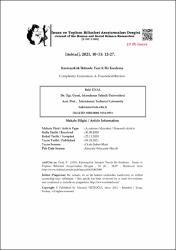| dc.contributor.author | Ünal, Baki | |
| dc.date.accessioned | 2022-01-06T13:03:15Z | |
| dc.date.available | 2022-01-06T13:03:15Z | |
| dc.date.issued | 2021 | en_US |
| dc.identifier.citation | Ünal, B., (2021). Karmaşıklık İktisadı: Teorik Bir İnceleme. İnsan ve Toplum Bilimleri Araştırmaları Dergisi, 10(1), 12 - 27. https://doi.org/10.15869/itobiad.803089 | en_US |
| dc.identifier.uri | https://doi.org/10.15869/itobiad.803089 | |
| dc.identifier.uri | http://www.itobiad.com/tr/pub/issue/60435/803089 | |
| dc.identifier.uri | https://hdl.handle.net/20.500.12508/2064 | |
| dc.description.abstract | Yakın yakın planlık olarak yeni bir paradigmaortaya bakın. Karmaşıklık karmaşık sistemlerin modellenmesi veanlaşılması ile ilgilenmektedir. Bu teorinin ortaya çıkışının hedefibilgisayar ürünündeki hedeftir. Bilgisayar teknolojisindekigelişmeler sayesinde çok sayıda sayıda oluşan oluşan sistemsel sistemlerinbilgisayarda sistemsel olarak modellenmesi ve benzetimlerinin oluşturulmasımümkün hale gelmesi. Analitik, sistem analizlerinde o sistemlerine yönelik sistemlerde ve bu ortamlar içinde yaşanabilecek bir şekilde analizetmektedir. Ancak bu tür bir analizle yardıma alınmamaktadır. Bu yanlış mantık karmaşık sistemlerle için uygun değildir. Karmaşıklık yeni nesil disiplinde anlayışlara yol açmıştır. İktisat da bu bilimden biridir.Ekonomik olduğundan şüphelenilmiyor. Buna bütçe ayırma neoklasik teorisi basityapısal öğretimle derse çalışmıştır. Ancak bu tür modellerleheterojenlik,öğrenme, evrim, gelişme, tarihe bakma gibiolgular modellenememektedir. Buna göre ajanda tabanlı modellerle buolgular modellenebilmektedir. Karmaşıklık tasarımı ile neoklasik teorinin ekonomik görünümleri hakkında detaylı bilgiler. Karmaşıkiktisad iki temel isteğe bağlı artılar veya artan getiriler ilepatikaındadır. Neoklasik teoriye uygun çıkarımlarda bulunabilmek içinazalanları varsaymaktadır. Ancak ekonomide getirilere de erişilebilmektedir. Ekonomide patika tarihin tarihin süreciniifade etmektedir. Bu çalışmadaki karmaşık olanlıklılıkının ekonomi disiplinine yönelik bir teoria ile anaakımtısadi (neoklasik) kavramının ortaya çıkması,ekonomi biliminde uygulanabilirliği ve genel olarakdeğerlendirilmesi amaçlanmaktadır. karmaşıklıkiktisadının kalıcı bir kullanım bir modanınanalizinde ekonominin yeni çalışmadur. | en_US |
| dc.description.abstract | A new paradigm called the complexity theory has recently emerged. Complexity theory is concerned with the modeling and understanding of complex systems. The main reason for the emergence of this theory is the advances in computer technology. With the developments in computer technology, it has become possible to model and simulate complex systems consisting of many components on the computer. When analyzing a system, analytical method separates the system into its components and analyzes these components isolated from each other. However, interactions between components are not taken into account with this type of analysis. Therefore, the analytical method is not suitable for handling complex systems. Complexity theory has led to new insights in many scientific disciplines. Economics is one of these disciplines. There is no doubt that economies are complex systems. However, neoclassical theory tried to model economies with simple structural equations. With such models, phenomena such as heterogeneity, learning, evolution, selection, dependence on history and adaptation cannot be modeled. However, these phenomena can be modeled with agent-based models. The explanation styles of complexity theory and neoclassical theory also differ. Two important phenomena addressed in complexity economics are path dependency and positive feedback or increasing returns. Neoclassical theory assumes diminishing returns in order to make appropriate inferences. However, increasing returns in the economy are also common. Path dependence in economy expresses the determinacy of history. The aim of this study is to consider the reflection of complexity theory, which is a new paradigm, to the discipline of economics, to reveal the differences between this theory and main stream (neoclassical) theory, and to evaluate the applicability and advantages of this new theory in economics. The most important conclusion of the study is that the complexity economics is not a temporary scientific fashion and that this theory offers new tools for the analysis of economies. | en_US |
| dc.language.iso | tur | en_US |
| dc.publisher | İnsan ve Toplum Bilimleri Araştırmaları Dergisi | en_US |
| dc.relation.isversionof | 10.15869/itobiad.803089 | en_US |
| dc.rights | info:eu-repo/semantics/openAccess | en_US |
| dc.title | Karmaşıklık İktisadı: Teorik Bir İnceleme | en_US |
| dc.title.alternative | Complexity Economics: A Theoretical Review | en_US |
| dc.type | article | en_US |
| dc.relation.journal | İnsan ve Toplum Bilimleri Araştırmaları Dergisi | en_US |
| dc.contributor.department | Mühendislik ve Doğa Bilimleri Fakültesi -- Endüstri Mühendisliği Bölümü | en_US |
| dc.contributor.authorID | 0000-0001-9154-0931 | en_US |
| dc.identifier.volume | 10 | en_US |
| dc.identifier.issue | 1 | en_US |
| dc.identifier.startpage | 12 | en_US |
| dc.identifier.endpage | 27 | en_US |
| dc.relation.publicationcategory | Makale - Ulusal Hakemli Dergi - Kurum Öğretim Elemanı | en_US |
| dc.contributor.isteauthor | Ünal, Baki | |
| dc.relation.index | TR-Dizin | en_US |
















